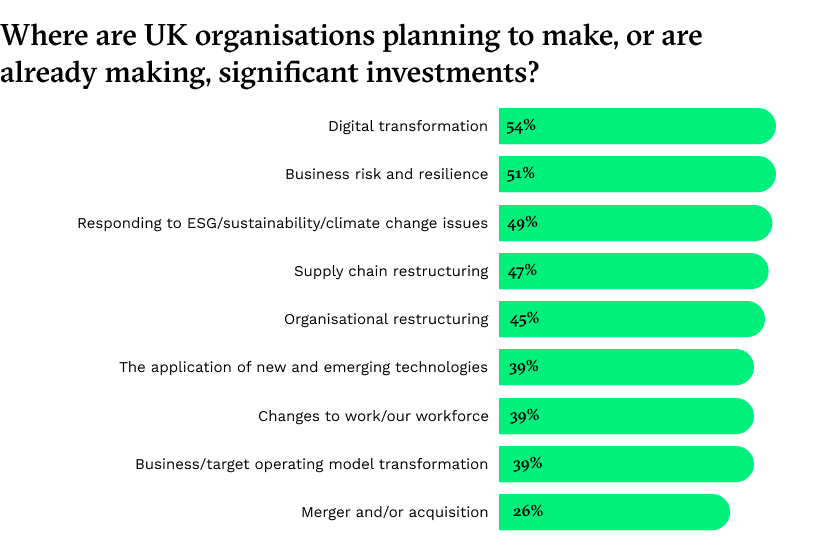The relationship between strategy and technology: What the UK market tells us
Our recent research on the UK consulting market—which is often a bellwether for other markets—might tempt strategy firms to despair. They shouldn’t: they should be seizing the initiative.
Demand for strategy consulting is the first casualty of business downturn. That was true during the 2007-08 financial crisis and in the early months of the pandemic, and it seems to be true again now. And as strategy loses, technology gains.
Our research found that eight out of ten large companies in the UK increased their investment in digital technology in the last year; a fifth say that their expenditure on technology was substantially larger than in the previous year. Fifty-four percent of UK organisations say that digital transformation is one of their main areas of investment.

Forty-two per cent of clients say that technology strategy will be one of the areas where they’re most likely to use consulting support, roughly twice the 21% who expect business strategy to be an area of significant spending. To make matters worse, 18% of clients think that business strategy will be one of the areas where they’re least likely to use consulting support (this doesn’t automatically mean that they’re not undertaking strategy work—they may, of course, be trying to use their own, in-house resources instead). This is compared to just 11% who say they’re unlikely to spend on external support around technology strategy.
But how you interpret these numbers depends on your definition of strategy. From speaking to clients, we know that the relationship between strategy and technology has long been problematic. Clients recognise that almost anything they want to do will depend on them changing their technology, but too much technology change can result in them never achieving their objectives. Large-scale digital transformation projects often slide off the tracks, losing sight of what they’re supposed to deliver; others hit the buffers, stopped by people’s ability to adapt. While recognising strategy and technology are linked—more so now than ever before—clients worry that in bringing them too closely together, they lose the strengths of both.
This fear is replicated in buying habits. Despite all the moves of strategy and technology firms to diversify into areas that will extend their reach across the value chain, consulting firms are still segmented by clients into strategy, technology, and the Big Four. While the major strategy firms have branched into compelling solutions in the technology space that have undoubtedly earned them billions in revenues, they’ve not succeeded in the greater task: changing how clients think about them.
How, then, should strategy firms respond in a crisis that is likely to reinforce the importance of technology to clients, whether they are looking for transformation change or simply to survive in an unpredictable environment?
The solution probably doesn’t lie in further honing of these firms’ propositions in the technology space. Instead, it might come from greater productisation. At face value, it sounds like a heretical suggestion: Strategy consulting sits at the opposite end of the spectrum, surely? Well, no. What strategy firms have been very good at doing is developing intellectual capital, ideas that have helped shape the thinking and actions of generations of managers. Some, such as NPS (Net Promoter Score, conceived by Fred Reichheld, a Bain consultant, and introduced to the world in 2003) became the gold standard in their field. These products didn’t take over the consulting process but enhanced it. Over time, most could be linked to the analytics of large datasets and become, at least in part, software tools.
The bigger strategy firms have a wealth of such tools, some they’re actively investing in, while others are languishing, unused in PowerPoint decks. The opportunity is to take—ironically—a more strategic approach. Strategy firms have an opportunity to bring their products together to demonstrate how ideas and technology can work together, and to show that technology change isn’t just about moving to the cloud (for example), but about putting new, practical tools in the hands of managers that help them exploit cloud-based datasets and take better, evidence-based decisions.
In addition to building up technology capabilities, strategy firms could reframe the fundamental relationship between business and technology—and now could be just the time to do it.


